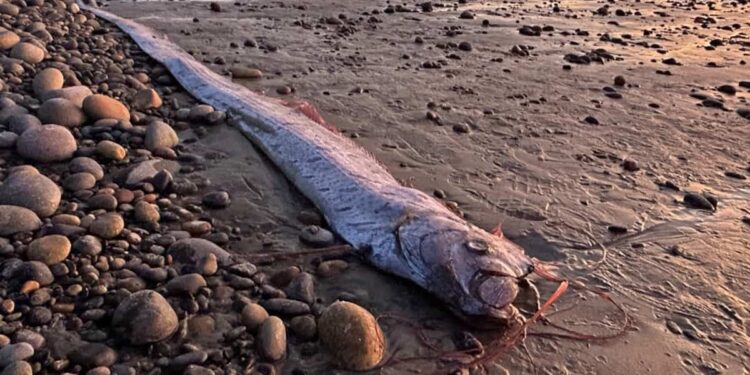A nearly 10-foot-long seabed ribbonfish, which is considered in Japanese folklore to be an omen of impending doom, is believed to have washed up again in California in early November.
“We collected samples and froze the specimen pending further study and final storage in the marine vertebrate collection,” Ben Frable, manager of the marine vertebrate collection at Scripps Oceanography in San Diego, reported in a press release this week. last reported by CNN.
At the beginning of November, the strange seabed creature, which usually lives up to 3,000 feet below the surface of the ocean, was stranded on Grandview Beach in Encinitas, California, according to the American media.
The latter would measure between 9 and 10 feet, which is equivalent to almost 3 meters long, we can read. These fish can reach up to 30 feet (9.1 meters), according to what 24 Heures reported last August.
Seen 22 times since 1901
What is special is that this “ribbon fish”, also nicknamed “sea serpent” or “apocalypse fish”, has only been seen 22 times in nearly 124 years, the department said. of oceanography.
But for reasons that remain unclear, this was the third appearance of this type of fish in three months, after a first specimen had washed up last August in the waters of La Jolla Cove, also in San Diego. , and a second in Huntington Beach in September.
“It could be due to changes in ocean conditions and an increase in the number of ribbon fish off our coasts,” Frable said. Sometimes it can be linked to broader changes, like the El Niño and La Niña cycles, but this is not always the case. There was a weak El Niño earlier this year.”
Snake “of the apocalypse”
The “apocalyptic” fish gets its nickname from a Japanese belief that the appearances of these deep-sea fish are a precursor to a natural disaster, such as an earthquake or tsunami, according to CNN.
In 2010, a dozen were reported on the Japanese coast just before Japan experienced its largest recorded earthquake in March 2011, according to the Ocean Conservancy.
This “mythical reputation” would, however, have been classified by experts as simple “folklore,” noted Scripps Oceanography on Friday.
“A 2019 study found no correlation between ribbonfish strandings and earthquakes in Japan,” it read.



